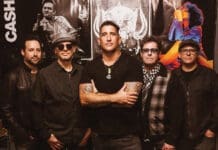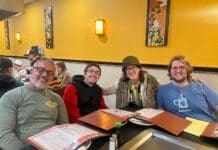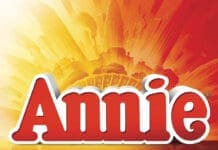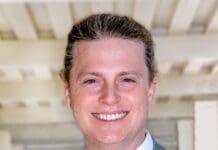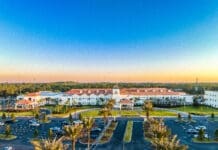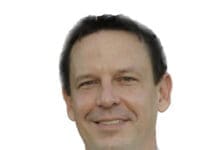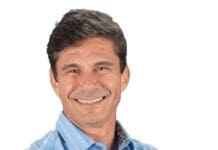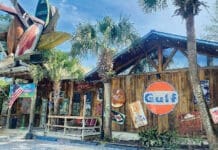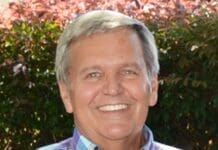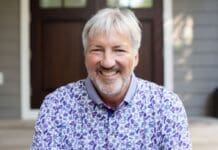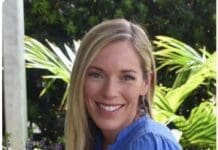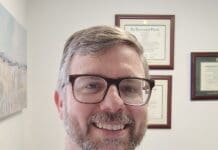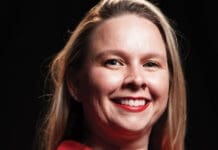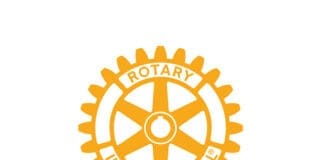By Kirk McCarley
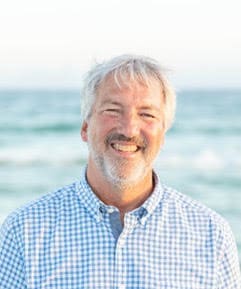
I first met Bob over 20 years ago in a Spinning Group Exercise Class. Even then I admired the passion and vigor with which he attacked each gathering, coupling those characteristics with a light, self-deprecating sense of humor.
After a few years, Bob allowed that he was thinking about becoming a spinning instructor. “You ought to join me,” he added. Loathe to pass on a challenge, I acquiesced to Bob’s suggestion.
Bob and I are still guiding people through group spinning classes. At an age surpassing 90 now his rides encompass the audial elements of a nostalgic visit to the Big Band sounds of Duke Ellington and Benny Goodman combined with a visual connection to the variety of cities he has visited, indicative of his earlier career as an urban planner and geography professor. The classes are light-hearted, lively, interactive, and I would daresay fun for the participants, besides serving as an inspiration to those of all ages.
As Bob now enjoys his tenth decade he said something to me a while back that resonated. “Kirk,” he stated, “The last 15 years of my life have been the best. I have this community of family, friends, and acquaintances from all walks of life and am fortunate to have seen and done a lot of different things. I am lucky to have had good health and the right attitude that allows me to do the things that I still do and enjoy.”
Bob’s later-in-life story brought to mind a host of others who are or were still making an impact in the years far beyond what is commonly the point of retirement.
A statistician and electrical engineer, W. Edwards Deming worked in relative obscurity first with quality control initiatives for various American industries, then later in Japan as that country slowly recovered from World War II. It wasn’t until late in the twentieth century that an NBC whitepaper report was released, “If Japan can do it, why can’t we?” and 80-year-old Deming began to make his mark in the U.S. For the last 13 years of his life, Dr. Deming became recognized as the guru of Total Quality Management and Continual Quality Improvement, leadership practices that revolutionized processes in manufacturing, medicine, and even government.
A few years ago my wife and I had the pleasure of attending an outside concert featuring Paul McCartney. Sir Paul, then 74, performed a full two and a half hours without taking a break and without a sip of liquid refreshment, even water. The pitch of his vocals remained strong and steady, his instrumental proficiency was superb, and his overall energy level high. What’s more, he has remained musically relevant, collaborating with current pop stars such as Rihanna more recently. McCartney certainly doesn’t need the money; rather he sees himself still as a musician and that’s just what he does.
Finally, there was my back-door neighbor growing up. Minus any form of transportation, other than public or pedestrian, I recall her making the two-mile round trip to the grocery store once a week and the five-mile round trip to church on Sundays, both by foot. We would visit on her side porch on hot summer days sharing a can of Vienna sausage and listening to Paul Harvey on the radio. Perhaps what was most impressive was that she spent a great majority of her summer days sprucing up her yard, with hand clippers, under the heat of the Texas sun. I never knew her first name, but Ms. Clark worked until the end, passing in her backyard with those clippers in her hand at 89.
Who inspires you? What do you still want to achieve? What will be your legacy and impact? It really should never be too late.
A graduate of the University of North Texas, Kirk McCarley is a Certified Professional Coach as well as a Professional in Human Resources (PHR) and SHRM-CP Certified. He also is a Production Assistant for both college football and basketball for ESPN and leads group cycling classes as a Certified Spinning instructor. Contact kirk@theseedsowercoach.com, theseedsowercoach.com, or call (314) 677-8779.







